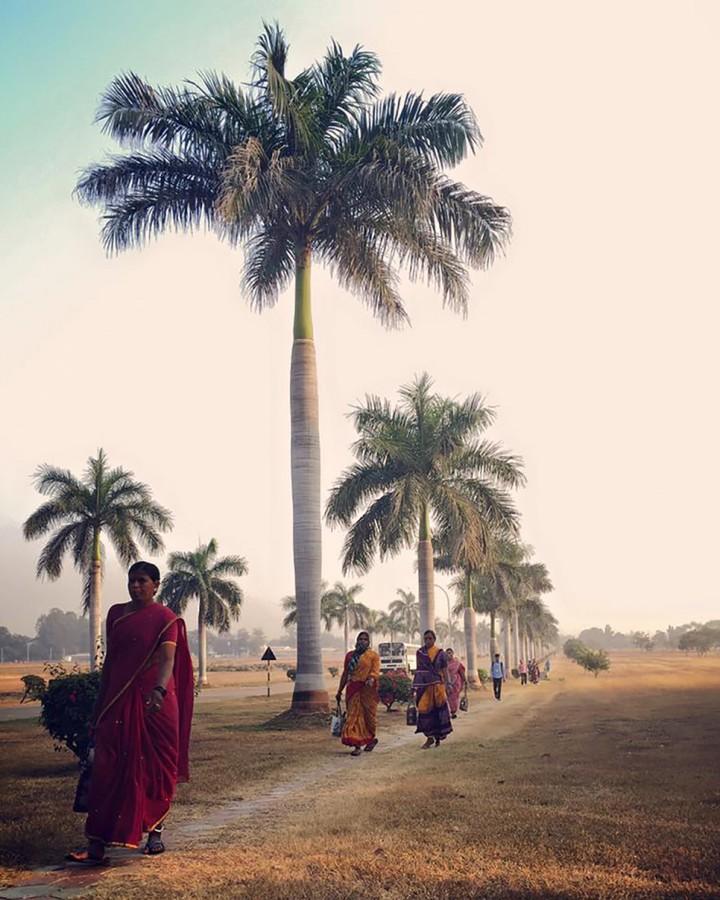Faculty-led group travels to India
Agribusiness professor Rami Reddy and 11 agriculture students first prepared for going abroad by visiting Chicago
Early morning in Hyderabad, India, a city with a population of approximately 8.7 million, environmental horticulture senior Kendall Welch woke to the relative peace of the hotel and went out to the pool.
“I’d go out in the morning and do yoga by the pool. It was something to calm me down,” Welch said. He said he felt he was able to get over jet lag faster by practicing yoga.
Welch, along with 10 other University of Wisconsin-Platteville students, traveled to India over Winterim and visited research centers, farms and a university. The trip was led by agribusiness professor Rami Reddy. None of the students had been to India before.
“One of the hardest parts was preparing for the trip. What do you bring to India?” Welch said. He decided to bring the essentials. This included a couple of outfits, some money and a book called Ashoka in Ancient India by Nayanjot Lahiri. Welch said that the book was a gift from his grandparents and it tells the story of an ancient Buddhist king in India.
The group prepared for the trip by traveling to Chicago to visit two Hindu temples and to eat at Indian food markets and restaurants.
“I always go to these places. They are very close by and students could get exposed first here,” Reddy said. “I think we prepared [the students] quite well.”
The trip, called Agriculture and Food Marketing in India, took place from Dec. 28 to Jan. 16.
According to the UW-Platteville website, the trip was intended to promote global understanding and awareness, and “importance [was] given to study the production agriculture and food marketing aspects of the rapidly evolving Indian economy with a special focus on newly formed states of Andhra Pradesh and Telangana.”
“The best part is that we went in-depth,” Reddy said. He said the trip went far beyond sightseeing. He first intended to open the trip up to just eight students, since it was his first time leading a trip like this, but more than eight were interested.
Preparing for the trip posed challenges for Reddy, as well as for the students.
“We had to plan well, [India] is not such an easy place to go,” Reddy said. “It took a lot of time and planning in advance to get permission to enter the agriculture facilities. I took care of all the small details.” He also said that friends and family in India helped him.
As the departure day grew closer, Welch said he experienced some nervousness.
“I was definitely nervous. I think when I signed up for the trip it seemed really far away and I thought I’d have a lot more time to get ready, but I was focused on classes and finals. I did a lot of yoga to stretch my body knowing that I was going on a really long plane ride. I did a lot of meditation to calm myself down. Waking-up the day of was kind of scary, like okay, I’m going to India,” Welch said.
The group met at Chicago O’Hare airport and flew to Dubai, where they had a brief layover. From Dubai, they flew to Hyderabad and arrived around 4 a.m. They then took a bus to the hotel, which was in a quieter part of Hyderabad, Welch said.
Welch said his first impression of India was “sensory overload.”
“Just getting in the bus and going out in the city was insane. Hyderabad has basically the population of Wisconsin in one city. And kind of a lack of infrastructure. You look on one side and there is a bunch of pigs. You look on the other side and there is five people on a moped,” Welch said.
Reddy said that he thinks the students were amazed.
“It was quite an opposite world for them,” Reddy said.
The group spent time in bustling Hyderabad, but also traveled to rural villages. Welch said he enjoyed the villages more.
“The city is really entertaining, but really high paced. There’s something about going into the village and having everything slowed down. You meet people that are really genuine. In the cities, Rami was really over protective. In the villages, I got to climb a coconut tree and go on a moped,” Welch said.
The group learned about agriculture production, food marketing and social issues, such as farmer suicides and the role of women in agriculture, Welch said. He said he expected to encounter a sanitized image of these issues, but this wasn’t the case and the group was able to learn a lot.
“I think before I went, I had a lot of ideas of stuff I want to do when I graduate and move on and I’ve ad trouble deciding. Going over there inspired me to do research in dry lad agriculture. It inspired me to find a way to improve methods in dry land agriculture as a way to help a lot of people,” Welch said.
He was also inspired to learn more about improving the lives of women in agriculture in India. The women often work barefoot, are paid very little and receive no compensaton if hurt on the job.
“They pretty much do everything,” Welch said.
Reddy said around 40 to 50 percent of costs were taken care of through grant money, including funds from the UW-Platteville Pioneer Academic Center for Community Engagement and the Undergraduate Research and Creative Endeavors office. Reddy said he is not yet sure if he will lead another trip like this again, but if he does it would likely be in two years.
Two other short term study trips took place over Winterim as well. One group traveled to Rome to study visual arts, and another to London to study British theater.




